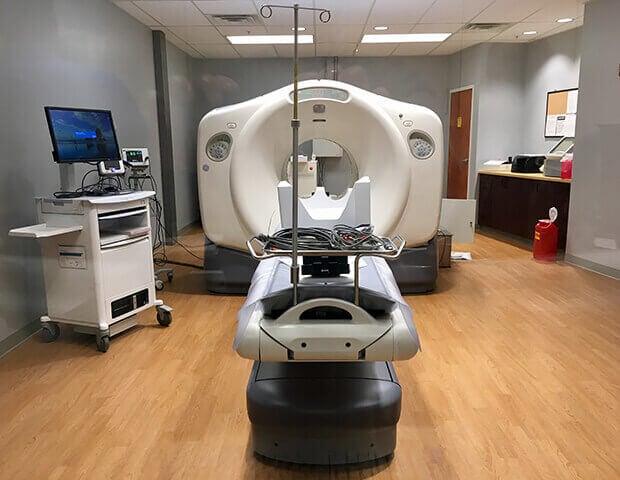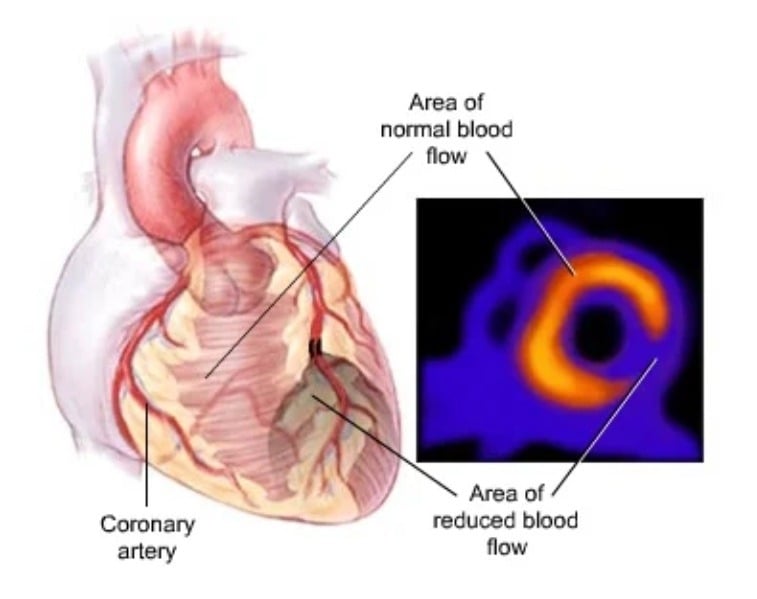Preparing For a PET Stress Test
Positron emission tomography (PET) tests are a type of imaging test that uses radioactive tracers to create detailed images of the body. A nuclear PET stress test specifically looks at blood flow to the heart during stress to locate areas of decreased blood flow that could indicate blockages and other underlying heart conditions, all while utilizing 90% less radiation than a nuclear stress test. Before getting this test, it is important to understand what a nuclear PET stress test can help diagnose and when you should request one from your doctor.
Preparing For a Nuclear PET Stress Test
Positron emission tomography (PET) tests are a type of imaging test that uses radioactive tracers to create detailed images of the body. A nuclear PET stress test specifically looks at blood flow to the heart during stress to locate areas of decreased blood flow that could indicate blockages and other underlying heart conditions, all while utilizing 90% less radiation than a nuclear stress test. Before getting this test, it is important to understand what a nuclear PET stress test can help diagnose and when you should request one from your doctor.

What is a PET Stress Test?
A nuclear PET stress test is a type of cardiac stress test that uses positron emission tomography (PET) imaging to visualize blood flow to the heart muscle. It involves injecting a radioactive tracer like rubidium-82 into the bloodstream while the heart is stressed using a medication called Lexiscan to increase blood flow to the heart. The PET scan then creates 3D images of the heart showing where the tracer, and therefore blood flow, is decreased or blocked. This allows doctors to pinpoint narrowings or blockages in the coronary arteries that supply the heart.

People may get a nuclear PET stress test rather than other options, like a treadmill stress test or stress echocardiogram, for a few key reasons. PET provides very detailed 3D images of the heart compared to planar nuclear imaging or ultrasound. It can accurately detect smaller blockages and milder limitations in blood flow. Additionally, PET stress tests are also better for patients who are unable to exercise enough for other stress modalities.

What is a PET Stress Test?
A nuclear PET stress test is a type of cardiac stress test that uses positron emission tomography (PET) imaging to visualize blood flow to the heart muscle. It involves injecting a radioactive tracer like rubidium-82 into the bloodstream while the heart is stressed using a medication called Lexiscan to increase blood flow to the heart. The PET scan then creates 3D images of the heart showing where the tracer, and therefore blood flow, is decreased or blocked. This allows doctors to pinpoint narrowings or blockages in the coronary arteries that supply the heart.
People may get a nuclear PET stress test rather than other options, like a treadmill stress test or stress echocardiogram, for a few key reasons. PET provides very detailed 3D images of the heart compared to planar nuclear imaging or ultrasound. It can accurately detect smaller blockages and milder limitations in blood flow. Additionally, PET stress tests are also better for patients who are unable to exercise enough for other stress modalities.

Benefits of PET Stress Tests
Nuclear PET stress tests are an advanced imaging option to precisely evaluate blood flow deficits that cause heart disease. The benefits of PET scans often outweigh the risks, especially for people who are at risk for or have been diagnosed with severe medical conditions.
Some of the key benefits of nuclear PET stress tests include:
- Excellent image quality
PET provides 3D images with higher resolution and clarity than planar nuclear tests or echocardiograms, which allows for a more accurate assessment of heart anatomy and function. - Detects mild disease
PET has high sensitivity, so it can uncover small blockages and subtle blood flow changes missed by other modalities. - Low radiation exposure
PET exposes the patient to less radiation than other nuclear medicine tests like SPECT. - Good option for those who can't exercise
Pharmacological stressing of the heart accommodates patients unable to reach target heart rates through activity. - Quantifies blood flow
PET can measure blood flow in milliliters per minute, which helps with analyzing coronary artery disease (CAD). - Assesses viability
PET can identify impaired blood flow to the heart that may recover with revascularization. - Guides interventions
Test results are useful for planning appropriate treatments like stenting, bypass, or medical therapy. - High diagnostic accuracy
PET has very good sensitivity and specificity for detecting obstructive coronary artery disease.
What to Expect During a PET Stress Test
Before The Procedure
In preparation for a nuclear PET stress test:
- Do not eat or drink anything for at least six (6) hours prior to the test.
- No caffeine twelve (12) hours before the test.
- Do not smoke for at least six (6) hours prior to the test.
- Do not take any Beta Blockers, Nitrates, or Erectile Dysfunction medication one day (24 hours) before the scan unless otherwise instructed.
- If you have any questions regarding other medications, please contact our office.
Before the scan, patients will first have an IV line placed, through which a radioactive tracer like rubidium-82 is injected.
During The Procedure
During the test, patients lie inside the PET scanner, where images of the radiotracer traveling to the heart are taken. Multiple sets of images are taken — first at rest, then again after the Lexiscan injection to compare blood flow and assess the condition of the arteries. The Lexiscan dilates arteries in the heart and simulates exercise, negating the need to walk on a treadmill.
After The Procedure
After the test, patients can resume normal diet and medications. It is recommended to drink plenty of fluids to help flush the radioactive tracer from the body quicker through urination. Patients may feel fatigued or have chest pain, shortness of breath, palpitations, or ECG changes during the test, but these typically resolve within a few hours. Once the PET images are processed, the nuclear medicine physician analyzes them for any areas of decreased blood flow indicating blockages. Results are shared with the referring physician and patient, along with appropriate treatment recommendations..jpg?width=762&height=700&name=CardiacPet%20(1).jpg)
Am I a Candidate for a PET Stress Test?
Your doctor can help you determine whether a nuclear PET stress test is appropriate for your situation. Certain medical conditions or limitations may factor into whether this particular test is suitable for you.
Signs that you may be a good candidate for a nuclear PET stress test:
- If you have chest pain or shortness of breath with exertion
- If you have risk factors for heart disease like high blood pressure, diabetes, or high cholesterol
- If you have unexplained/ongoing symptoms that may indicate heart disease
- To check coronary artery blockages if you have had a prior heart attack or procedure
- If previous cardiac tests were inconclusive and more imaging is needed
- If an imaging test with higher accuracy than standard stress tests is preferred
You should NOT get a nuclear PET stress test if:
- You are pregnant or breastfeeding (radiation exposure risk)
- You have severe lung disease or poor exercise tolerance
- You have a condition causing inability to lie still during the scan
- You have severe kidney dysfunction (impairs tracer elimination)
- You have an allergy to the radioactive tracer agents used
- You have had a recent nuclear imaging procedure
Photo Gallery
Video Gallery
Testimonials
Photo Gallery
Get to Know Our Cardiologists

